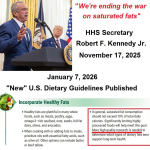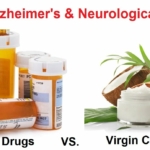
Ancel Keys was one of the first researchers who suggested a link between cholesterol and heart disease in the 1950s, but even his study was biased and excluded population studies from certain countries that did not support his theory.
by Paul Fassa
Health Impact News
A group of independent medical academics challenged a recently published BMJ (British Medical Journal) 20 year follow-up study that claimed favorable results among those using statins as a preventative measure. It was known as the West of Scotland Coronary Prevention Study (WOSCOPS), the first trial attempting to demonstrate a significant reduction in cardiovascular events with statin therapy for primary prevention.

Uffe Ravnskov MD, PhD
The critical report challenging the BMJ’s statin-promotion based on the WOSCOPS study was published recently, October of 2017. The challenging trio of medical scientists, led by independent researcher Uffe Ravnskov MD, PhD, author of The Cholesterol Myth and Fat and Cholesterol are Good for You, parsed and picked at the study to show it is flawed.
The Ravnskov et al. challenging report, Serious bias in 20 year follow-up study of statin trial, states the following:
[T]he study has serious bias. As mentioned in the supplement: “At five years after the completion of the randomised trial 38.7% and 35.2% of patients originally allocated to pravastatin and placebo arms, respectively, were taking statins (P<0.001). No later data on the proportion of individuals on statins were available.”
Many patients stop taking statins. In a study of over 140 000 elderly people, two thirds of those with cardiovascular disease (and even more of those without) had stopped treatment after two years.
The question is, therefore, whether the mortality benefit among those with the highest LDL cholesterol is due to statin treatment or to their high LDL cholesterol.
The question is relevant because a recent systematic review of 19 cohort studies including 68 094 elderly people (≥60 years) followed for several years found an inverse association between all cause mortality and LDL cholesterol in 92% of participants.
In the largest study those with the highest LDL cholesterol lived longer than those taking statins.
The Ravnskov et al. letter is not the first complaint against BMJ’s publishing “cheerleaders” for statins using the WOSCOPS study.
Here is another study recently published in the BMJ. It is a different trio of dissenting doctors with the outspoken Dr. Malcom Kendrick involved as one of the authors. It’s called Exaggerated report of benefits in a flawed long term statin treatment study. (Source)
Interestingly, Dr. Ravnskov is based in Sweden, the first nation to reject the saturated fat dogma for heart disease in 2013. (Source)
The Basic Folly of Lowering Cholesterol
Statins are efficient at lowering cholesterol, but that’s not necessarily beneficial, and in fact can be very unhealthy. Recent unbiased scientific observations provide evidence that cholesterol buildups in arteries is actually an attempt at patching the inflammation that’s weakening an artery within the blood vessel.
It has been discovered and documented that among cholesterol’s important functions is its ability to boost immune system responses against micro-organisms, which are also involved with weakening the cardiovascular system. (Source)
The dogma of fat producing cholesterol and cholesterol causing heart disease has been proven wrong in many studies, yet it still stands with mainstream medicine. (Source)
Actual studies have shown that people with high cholesterol live longer, and people with low or acceptable levels of cholesterol have twice as many heart attacks! (Source)
It has been discovered that lowering cholesterol can have bad effects on people who are otherwise healthy including inflamed and weakened painful tendons and muscles, and fading memory. This happens as they are robbed of the important substance that builds cell walls, most of our brain matter, the central nervous system’s protective myeline sheath, sex hormones, and is vital for converting vitamin D from sunlight.
What about those claims that statins may also help prevent cancer? A population based or epidemiological case study was conducted in Taiwan as a response to the statin cancer prevention claims. The researchers examined 388 prostate cancer cases and 1,552 controls. They found the use of any statin was associated with a significant increase in prostate cancer risk. (Study abstract)
Many are prescribed statin drugs, who have no history of poor cardiac health, as a preventative measure based on cholesterol levels and triglyceride readings.
The Latest Statin Drug Prescription Guidelines Add More Potential Statin Customers
The new guidelines recommend that people ages 40 to 75 who have one or more risk factors, such as high cholesterol, high blood pressure, diabetes or smoking, (which puts them at a 10 percent or greater risk of having a heart attack or stroke in the next 10 years), should be on statins.
There were some MDs who openly objected to these guidelines, but they were ignored. The 2013 guidelines for prescribing statins were intended to add an estimated 24 million statin drug users to the 32 million+ already on them in the USA alone as of 2011.
The statin drug Lipitor, which is the single biggest money making pharmaceutical ever, combined with Lipitor competitors Crestor and Zocor, have accumulated billions in sales, making the statin industry worth at least $30 billion even before the 2013 guidelines. (Source)
Conflicts of Interest Dominated the New Statin Prescription Guidelines
The current statin guidelines were put together in 2013 by a task force committee rife with doctors who had various pharmaceutical (direct or indirect) financial relationships to the pharmaceutical industry using the cover of heart attack prevention to create more patients. The new guidelines were created with obvious conflicts of interest.
Doctors’ statements against the new guidelines were posted in a NY Times Op-Ed and the British Medical Journal (BMJ):
NYT Op-ED:
“Instead of converting millions of people into statin customers, we should be focusing on the real factors that undeniably reduce the risk of heart disease: healthy diets, exercise and avoiding smoking.”
“The group that wrote the recommendations was not sufficiently free of conflicts of interest; several of the experts on the panel have recent or current financial ties to drug makers. In addition, both the American Heart Association and the American College of Cardiology, while nonprofit entities, are heavily supported by drug companies.”
BMJ:
“The chairman and one of two additional co-chairs of the working panel that wrote the controversial cholesterol guidelines on reducing cardiovascular risk, released last week, had ties to the drug industry at the time they were asked to lead the panel. And, in all, eight of the 15 panelists had industry ties.” (Source)
Where’s the outrage? Statin drugs are a national health hazard and they are being pushed more based on compromised and tainted panel recommendations. Somehow, mainstream medicine and most of mainstream media agree on ignoring the implicit hazards of statin drugs.
It’s time to wake up to this incredible scam.
Conclusion: Cholesterol and Statin Drug Research is Biased and Potentially Dangerous
Health Impact News has many articles on the cholesterol myth and the dangers of statin drugs.
There is a growing list of doctors not involved financially with the pharmaceutical industry who speak of the importance of cholesterol and how unwise it is to lower it chemically.
Comment on this article at HealthImpactNews.com.



 HHS Secretary Kennedy Breaks His Promise: "War on Saturated Fat" Kept in Tact with New U.S. Dietary Guidelines
HHS Secretary Kennedy Breaks His Promise: "War on Saturated Fat" Kept in Tact with New U.S. Dietary Guidelines Research Continues to Show Virgin Coconut Oil's Effectiveness in Treating Cancer
Research Continues to Show Virgin Coconut Oil's Effectiveness in Treating Cancer Coconut Oil Continues to Benefit Alzheimer's Patients over Drugs as Studies Continue for Neurological Benefits
Coconut Oil Continues to Benefit Alzheimer's Patients over Drugs as Studies Continue for Neurological Benefits How the Simple High-Fat Low-Carb Ketogenic Diet Continues to Change People's Lives
How the Simple High-Fat Low-Carb Ketogenic Diet Continues to Change People's Lives New Studies Continue to Show that Coconut Oil is the Best Oil for Treating Skin Conditions and Maintaining Healthy Skin and Teeth
New Studies Continue to Show that Coconut Oil is the Best Oil for Treating Skin Conditions and Maintaining Healthy Skin and Teeth